Great bowls of food. It’s a dining trend making the rounds in recent years as restaurants large and small, corporate and independent, have rolled out acai smoothie bowls, burrito bowls, grain bowls, poke bowls and more.
How do we love food bowls? Let us count the ways:
- They’re quick and easy to assemble;
- They’re infinitely customizable, so you can mix flavors and textures without repeating even if you visit a bowl bar several times a week;
- They’re portable, so you can eat on the run — the bowl’s rim helps prevent spilling;
- They’re filling and relatively nutritious compared to most fast-food options;
- They’re pretty enough to inspire Instagram obsession.
What’s not to love? Bowls are so big even Prince Harry and Meghan Markle had them served at their wedding breakfast last year – a royal seal of approval.
Florida Gulf Coast University students and alumni are finding the “bowling” trend right up their alley, too, for a lot of reasons. These are entrepreneurial folks with ambition who don’t want to work for somebody else or settle for the 9-to-5 office routine. They feel passionate about providing wholesome food for themselves, their families and their communities. They care enough about sustainability to use recyclable or compostable bowls, utensils and straws.
Here’s the scoop on four bowl-based businesses started locally by FGCU students and alumni.
Bahia Bowls Acai Café
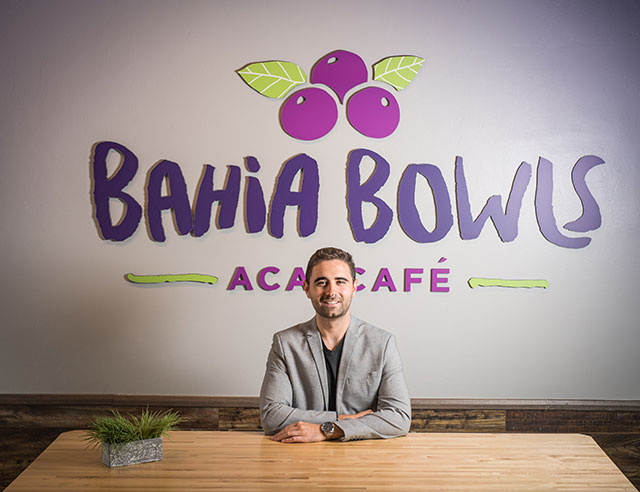
Ben Casey (2018, Legal Studies) got his first taste of being his own boss when he was just 7 and selling ice to fishing parties embarking from Duck Key, where his family lived. Now 22, he’s channeling his appetite for business into negotiating real estate and franchise deals for Bahia Bowls Acai Café, which he opened in 2017 with a store just down the road from FGCU. The Estero café serves fruit, oatmeal and kale-spinach bowls as well as smoothies and coffee.
“I’ve been starting businesses since I was a kid. I knew from a young age I wasn’t ever going to want to work for somebody else or have a ‘real’ job. I love working for myself and building something from the ground up,” he says.
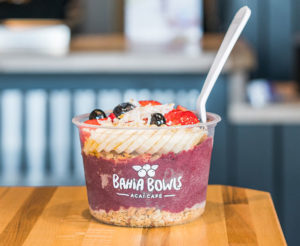 By the time he was an FGCU sophomore in 2016, Casey was exploring ideas for a food business and studying the market for untapped opportunities. Nutrition-packed bowls of “superfruits,” nuts and granola were popular in other parts of the country but hadn’t yet taken off in Southwest Florida, and he himself was interested in eating fast, convenient, healthy food. With relatively low operating costs, manageable overhead and payroll, and a limited inventory of products, Bahia Bowls fit his criteria.
By the time he was an FGCU sophomore in 2016, Casey was exploring ideas for a food business and studying the market for untapped opportunities. Nutrition-packed bowls of “superfruits,” nuts and granola were popular in other parts of the country but hadn’t yet taken off in Southwest Florida, and he himself was interested in eating fast, convenient, healthy food. With relatively low operating costs, manageable overhead and payroll, and a limited inventory of products, Bahia Bowls fit his criteria.
“I did a year of research and development before opening,” Casey says. “It’s hard to get something like this going and get funding when you’re 19. You have to know what you’re talking about to get people to take you seriously.”
Casey’s research — and the 14-hour days he put in at the beginning — are paying off. He hopes to sell five Bahia Bowls franchises and open two more corporate locations this year. Keys to his success include high-quality ingredients and good customer service, he says.
“You have to treat every customer well, make sure every procedure is followed to a T, and make sure employees are doing right by the customers,” he says. “You don’t realize how true that is until you see people come back day after day to eat something you’ve made — or you see a negative Yelp review.”
Giving back to the communities that support Bahia Bowls has always been part of the business equation for Casey. Most of the dozen employees are FGCU students, and he partners with student organizations on fundraising promotions. A portion of Bahia Bowls’ profits also goes to Rainforest Foundation US, which works to protect the rainforest and secure land rights for Indigenous communities in Brazil — many of which harvest acai berries.
“It lines up with our vision,” Casey says. “FGCU helped teach me the importance of the environment. With Colloquium and other classes, I took a lot of field trips that centered around that.”
The Bowl
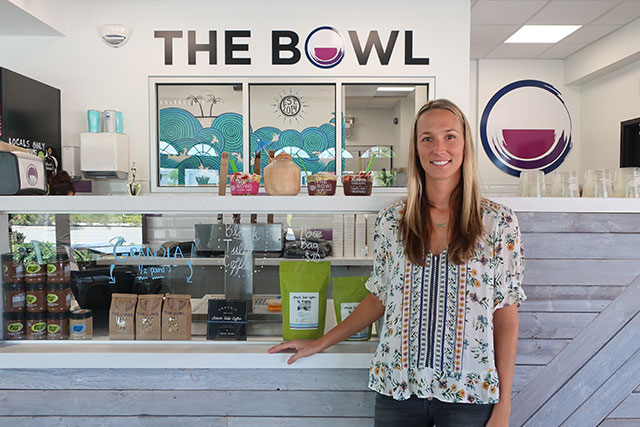
While living in California, Kylee Brinkman (2008, Management, Resort & Hospitality Management) became “obsessed” with the acai and pitaya bowl shops that were as common as sunny days in the Golden State. When she and her college-sweetheart-turned-husband Mike Brinkman (2006, Management; 2010, Accounting) moved back to Naples, she couldn’t find the food she’d grown to love. So she made it herself at home.
“It took me about a week to decide that I had to go into business,” says the owner of The Bowl, which has two stores in Naples. “I developed my own recipes and did everything from the bottom up. I didn’t have a doubt in my mind that this was going to soar. It’s the right fit — especially with the weather here. People love to come in from the heat and enjoy something cool, fresh and healthy.”
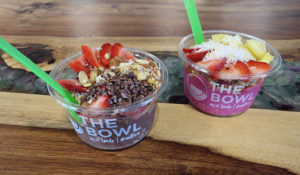 Brinkman, 34, unveiled her first cafe in 2015, serving organic and non-dairy acai and pitaya bowls, smoothies, matcha, cold-brewed coffee and kombucha on tap. This came after a year and a half of vending at farmers’ markets — a good way to test her concept and the demand without investing a lot of capital, she says.
Brinkman, 34, unveiled her first cafe in 2015, serving organic and non-dairy acai and pitaya bowls, smoothies, matcha, cold-brewed coffee and kombucha on tap. This came after a year and a half of vending at farmers’ markets — a good way to test her concept and the demand without investing a lot of capital, she says.
“One of the biggest challenges was people would walk by and look at me like, ‘What’s that?’ Nobody had heard of acai. There was a lot of educating the public, but it’s something I’m passionate about,” Brinkman says. “Being organic, we spend two or three times what a conventional store would spend on ingredients but I’m not charging a premium price. It’s worth it. This is something I can stand behind.”
When business took off quickly, Brinkman was prepared thanks to what she learned in her classes at FGCU and through an earlier “green” cleaning company that she and her husband had started and then sold.
“FGCU gave me the tools I needed. I learned a lot of things that put me ahead of the curve when I started my business. Like developing a thorough business plan — I worked on mine for months,” she says. “Businesses fail by not being prepared for quick growth. So in my head I was thinking ahead to what the business could possibly be and planned for that.”
She also planned for sustainability, sharing her fruit trimmings with a local farmer who composts, and committed to cultivating a positive work environment for her 40-50 employees. Affirmations are printed all over the restaurants. Measures like these assure Brinkman her business is good for the community her two children are growing up in.
“This is the best possible thing I can be doing in my life for my community and everybody around me,” she says. “It’s been a fun journey and I’m literally using my degree.”
BuddhaBlends
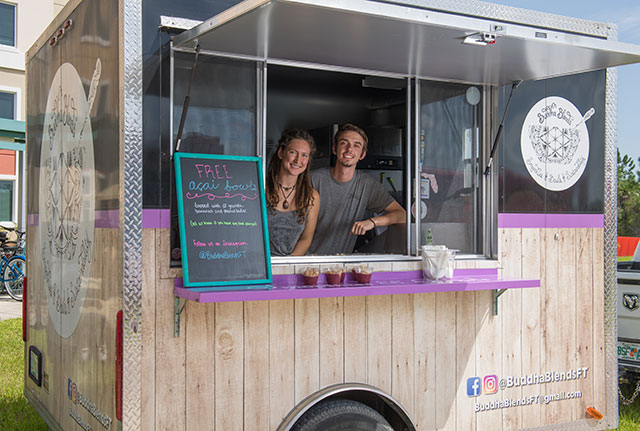
When Kyle and Ariana Govan launched their BuddhaBlends Vegan Food Truck in 2017, they wanted to provide an alternative to the usual mobile meals of tacos or barbecue. Although they started out serving fruit-based bowls and smoothies made to order, they discovered their customers wanted more savory options, too.
How about a bowl of creamy mac and cheese — hold the cheese? BuddhaBlends sauces its pasta with a homemade “cashew queso,” a mixture of buttery nuts, savory nutritional yeast and other non-dairy ingredients. Their nachos get smothered with that queso and with seasoned ground walnuts that mimic the texture of meat.
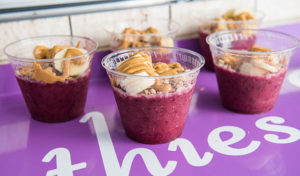 “We wanted to do something different,” says Kyle Govan, 23, an FGCU interdisciplinary entrepreneurship studies major on track to graduate in December. “We went to California in 2016 and saw all the different food truck concepts there. When we came back here we were disappointed.”
“We wanted to do something different,” says Kyle Govan, 23, an FGCU interdisciplinary entrepreneurship studies major on track to graduate in December. “We went to California in 2016 and saw all the different food truck concepts there. When we came back here we were disappointed.”
“There was nothing healthy that was mobile,” Ariana Govan, 23, chimes in. “We’re both vegan, so it was important for us to do something healthy.”
High school sweethearts in Clearwater, the couple moved to Fort Myers to attend FGCU then got sidetracked by the idea of adapting the food they cooked at home as a product they could start a business around. With less overhead and the flexibility to travel, mobile was a better choice than brick and mortar for them. A brief spell setting up their kitchen in a coffeehouse earlier this year validated their original plan, and now they’re on the road again catering to an audience they’ve built by word of mouth and via Instagram.
With their plant-based menu and their food trailer attached to a pickup truck, they have hitched up to another trend sweeping the region: microbreweries. After a couple of pints of high-octane craft beer, what could be tastier or more sobering than a bowl of mac and “cheese”? It’s a mutually beneficial relationship for brewers and food vendors.
“Cities can have a lot of restrictions on where trucks can park — that’s why breweries are the No. 1 place for food trucks,” Kyle Govan explains.
Lately, BuddhaBlends has been parking at Millennial Brewing Co. and Remedies Parlor in downtown Fort Myers as well as at special events across the county. When the Govans first started they felt obligated to accept any gig they were invited to; burnout ensued. They’ve since found a better life-work balance doing four or five locations a week — which also allows Kyle Govan time to take the remaining classes he needs.
“A lot of the courses I’ve taken have greatly helped me work on things in our real life,” he says. “ ‘Intro to Entrepreneurship’ was especially helpful. I learned a lot about planning for the future.”
Uhmazebowls
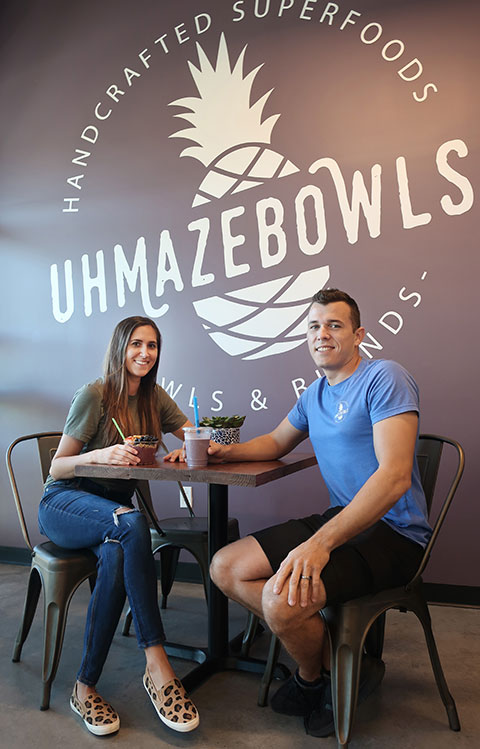
The old Kix cereal slogan “Kid tested, mother approved” could apply to the superfood bowls and blends served up at Uhmazebowls in Fort Myers. Eden McIntyre (2013, Special Education) began concocting bowl-based recipes in her kitchen when the first of her two daughters started eating solid food. It didn’t take long for her husband Brad McIntyre (2009, Marketing and Management) and her to see an opportunity; he already had several small businesses under his belt.
“I wanted to make things that were healthy and easy for her to eat. Now my kids are my biggest taste-testers,” says Eden McIntyre, 28. “Brad was the one who suggested selling bowls at the farmers’ markets. His expertise is what guided me along the way — I was a stay-at-home mom after teaching for a couple of years. I wasn’t expecting much to come of it, but we started selling out what we brought and people asked where our store was. That’s when we realized there was a demand for this kind of product on a larger scale.”
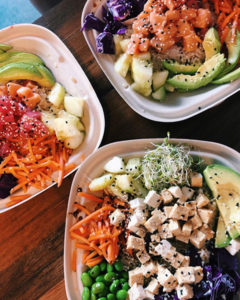 The McIntyres didn’t have a storefront back then in 2016, but they do now, along with 14 employees. Uhmazebowls opened late last year in a south Fort Myers complex anchored by Whole Foods. The organic grocery is a magnet for the demographic that also craves the healthy fruit, vegetable and poke bowls that Uhmazebowls dishes out, sprinkled with cacao nibs, hemp seeds and bee pollen.
The McIntyres didn’t have a storefront back then in 2016, but they do now, along with 14 employees. Uhmazebowls opened late last year in a south Fort Myers complex anchored by Whole Foods. The organic grocery is a magnet for the demographic that also craves the healthy fruit, vegetable and poke bowls that Uhmazebowls dishes out, sprinkled with cacao nibs, hemp seeds and bee pollen.
“The clientele is already in the parking lot,” says Brad McIntyre, 32.
As they plan for potential expansion with more stores, the couple is still considering whether to continue serving farmers’ markets next season. It’s all a lot to juggle along with children, but the McIntyres enjoy making the connections — and they’re in the position to call the shots. That was one of their motivations for going into their own business.
“We just didn’t like being told what to do, knowing we could do it differently with a better outcome,” Brad McIntyre says. “Now we can do things the way we want to do them.”
That includes supporting community organizations like Family Initiative Inc., a Cape Coral nonprofit that helps families impacted by Autism Spectrum Disorder, as well as small local businesses like those that built the store’s furnishings and provide their nitro brew coffee.
“The bar by the window was made from a pine tree that fell next to the Edison & Ford Winter Estates during Hurricane Irma,” Eden McIntyre says. “We like to incorporate local history and local companies. We think of this as a homey, local place. If we expand to stores in other cities, we want to continue that trend and adapt them to wherever they are.”